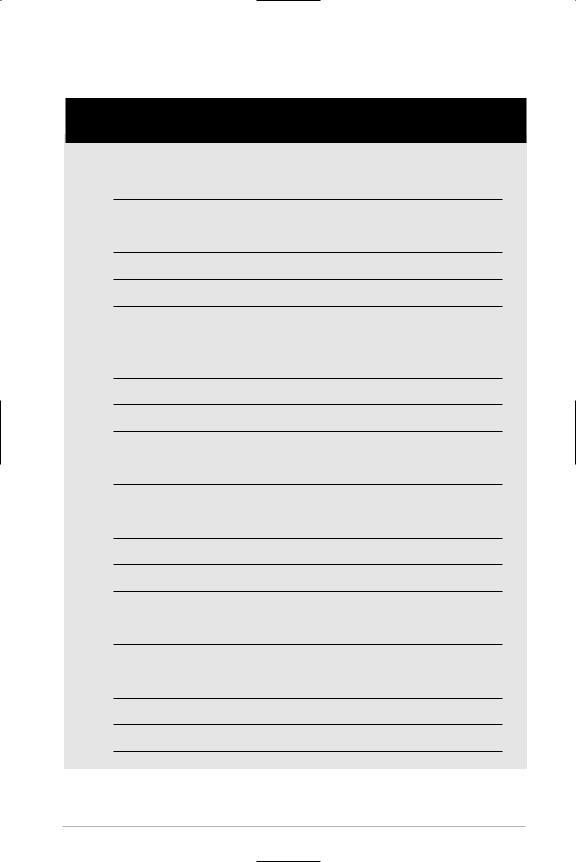
- •About This Book
- •CONTENTS
- •Looking Forward to Career Growth
- •Take a Personal Career Interest Survey
- •Rule 1: Motivation Is the Key to Success
- •Rule 2: Success Takes Hard Work
- •Rule 3: Follow Your Dream
- •Rule 4: Honor Your Talents
- •Rule 5: Manage Yourself
- •Rule 6: Take Calculated Risks
- •The Thrill of Defeat?
- •Common Causes of Career Failure
- •Turning Failures Around
- •Are You Just Waiting for a Pension?
- •A New Phase of Life
- •Managing Late Career Change
- •Limitless Potential
- •Do Good Work
- •Develop Marketable Skills
- •Be Willing to Pitch In
- •Expect the Unexpected
- •Develop an Innovative Spirit
- •Learn to Manage Risk
- •Know How to Job Hunt
- •Feed Your Rolodex
- •Strategy 1: Stop Watching the Clock
- •Strategy 2: Learn to Take a Compliment
- •Strategy 4: Take Criticism for What It’s Worth
- •Strategy 5: View Politics as a Challenge
- •Strategy 6: Build Positive Relationships
- •Strategy 7: Stay Positive
- •Strategy 8: Take Responsibility for Your Own Happiness
- •Strategy 9: Don’t Confuse Your Job with Your Life
- •Strategy 10: Have a Plan to Get Out
- •Anxiety Rules
- •Get in Touch with Your Emotions
- •Devise New Solutions
- •Make a Commitment to Be Part of the Solution
- •Attitude Is a Key Variable
- •View This as a Learning Opportunity
- •Be Prepared to Walk Away
- •The Lies We Tell Ourselves
- •Timing Your Departure
- •An Emotional Journey
- •Saying Farewell
- •An FBI Agent Stands Up for Her Principles
- •A Lack of Ethics
- •The Argument for Business Ethics
- •Fight Subtle Pressures
- •Find a Role Model
- •Defend Your Rights
- •Reshape the World
- •Trust Your Inner Strength
- •Take a Break
- •Thinking of a Permanent Vacation?
- •Starting a Whole New Life
- •Less Is More?
- •Alternative Work Arrangements
- •Pay Attention to Yourself
- •Start on the Right Foot
- •Laughter Really Is the Best Medicine
- •Laugh in the Face of Fear
- •Finding Everyday Fun
- •From Play to Success
- •What Delights You?
- •Take on a New Adventure
- •Improve Your Social Life
- •Managing Your Boss
- •Finding a Mentor
- •Starting Your Own Business
- •INDEX

W O R K / L I F E B A L A N C E :^)
When you deviate from tradition, you’ll undoubtedly encounter some skeptics and critics who prefer conformity to imaginative problemsolving. You can follow their tired prescriptions for success, or take your cues from someone like Robert Shaw, conductor of the Atlanta Symphony Orchestra. At the 20th anniversary of the Kennedy Center, Shaw was one of six performing artists honored for a lifetime of achievement. Said Shaw: “The only crescendo of importance is the crescendo of the human heart.” Another musical great gave similar advice. In a conversation between pianist Vladimir Horowitz and Arturo Toscanini, the great conductor cautioned Horowitz to take his own counsel: “If you want to please the critics, don’t play too loud, too soft, too fast, too slow.”
Pay Attention to Yourself
You can devise a zillion creative solutions for conflicts between your work and personal life. But they all require some introspection. Change comes from the inside out, so you have to pay attention to yourself. As Mary Nissenson Scheer says, “You don’t need someone else to tell you when you’re in love. You trust your instincts.” In her opinion, most people don’t trust their gut enough. They look to others to hand them ready-made answers that seldom (if ever) work. Until you learn to heed the signal from your own heart, it doesn’t matter what others want and think you should do.
Peggy Simonsen, president of Career Directions in Rolling Meadows, Illinois, tells a fable about what happens to people who listen too much to others’ dictates.
Two men were taking an ass to market for sale. Since they had many miles to travel, they took turns riding on the animal’s back. First, one man would ride while the other walked. Then, they’d reverse roles.
Halfway through the journey, they stopped for a drink. As they rested, an old friend passed by and stopped to visit. “Look at that poor animal, “the friend said. “It’s totally
213

:^) C H A P T E R 1 0
worn out. While you two ride in luxury, that poor creature is getting heat exhaustion.”
The men agreed. The animal did look tired. Refreshed from their break, they decided to walk the rest of the way. For the next few miles, they trudged down the long, dusty road.
Soon, they bumped into a local merchant who was also bringing his wares to market. The merchant eyed the ass skeptically.
“If you want to get any money for that animal at all,” he said, “you’d better carry it the rest of the way. Otherwise, it won’t be worth a plugged nickel.”
The two men were tired, but the merchant did seem to have a point. So they scrounged around in the woods for tree branches that’d be sturdy enough to support the animal’s weight. They tied its hoofs to the makeshift poles and hoisted the upside-down animal gingerly onto their shoulders, trying to distribute the weight evenly.
Trudging ever more wearily along, they arrived at a bridge stretched across some whirling rapids: the last leg of the journey. As they negotiated the steep incline, one of the men suddenly tripped on a small stone and toppled sideways. He lurched against the railing, taking the poles—ass and all— with him. Unable to stop the momentum, the other man also lost his balance. Helplessly, they watched the ass collapse into the water and drown.
When I heard the tale, Simonsen was speaking to a packed house of college students who were waiting expectantly for her conclusion.
“What do you think is the moral of the story?” she asked.
Silence, except for a few uncomfortable giggles.
“Listen to everyone’s advice and you will surely lose your ass.”
214

W O R K / L I F E B A L A N C E :^)
Start on the Right Foot
If your job doesn’t allow much calendar and clock freedom, you might find yourself fighting for every moment of free time you get. It helps if you can clarify your needs (and your employer’s expectations) soon after you’re hired. Then, after you’ve agreed on a schedule, you won’t have to justify your actions every time you leave at 5 p.m. or don’t come in on the weekends. Even if you can’t get much schedule flexibility, you can still set realistic limits to your workday. As Emerson said: “If you can’t be free, be as free as you can.
Five Career Fantasies
Everyone dreams about what they would do if they didn’t have to work. How many of these common career fantasies have you caught yourself yearning for?
Hitting the Road
Jack Kerouac fantasies of hitting the open road. Getting behind the wheel of a car—or better yet, an 18-wheeler—and being out in the wild blue yonder, making your own plans, no one looking over your shoulder, no office politics to worry about.
Taking a Big Risk
Living a life of adventure: racing cars, climbing mountains, fighting fires, catching crooks.
Being More Creative
Writing, painting, acting, drawing. Taking some creative risks. Being a creative person. Developing more creativity.
Tahiti, Inc.
Moving somewhere fun like a tropical island.
Make a Contribution
Doing something that’s not “just” about making money.
215

:^) C H A P T E R 1 0
Former FBI Director Louis Freeh had the good sense to negotiate some free time into the terms of his employment agreement. Freeh at first declined the $133,600-a-year job, citing disruption to his family life as his primary concern. When his wife prevailed on him to reconsider, he said he’d take the job under one condition: He promised to work diligently for the FBI, but he also planned to reserve quality time for his wife and two sons.
The White House agreed and the appointment moved forward. But it’s unlikely that Bill Clinton anticipated just how seriously his FBI director took his commitment to his family. Late one Friday, Freeh was notified quite suddenly that he was expected at a Saturday-morning White House meeting. Sorry, he replied. Unless it was a national emergency, his Saturday morning was already booked. He’d promised his sons that he’d attend their basketball game, and he intended to keep his word.
Of course, you aren’t Louie Freeh. But you can learn an important lesson from his modus operandi:
1.Be very clear about your needs and priorities.
2.Be very, very good at what you do.
3.Make sure your employer knows just how good you are.
4.Insist that your employer meet your needs.
Most people don’t change their lives all at once. It’s an incremental process that takes constant self-evaluation, careful goal-setting, and self-directed action. You must persist in the face of obstacles and criticism. Succeeding in your new life requires clear thinking to understand that reality isn’t always as idyllic as you might expect. But it’s not an impossible dream. And it can be well worth the effort. Just the other day, one of my more inspired life-changing clients (who took early retirement to pursue other career goals) startled me with an incredible statement: “I feel as if I’m living in the center of a chocolate cake,” she laughed. “Everything around me is so sweet.”
216

W O R K / L I F E B A L A N C E :^)
Work/Life Balance: Making a Life While Making a Living
Thought-Starter Worksheet
1.Do you wish that you had more time for yourself?
2.Where do the greatest demands on your time come from?
3.Can you enlist more support to help you meet your responsibilities? From whom?
4.How good are you at setting limits?
5.What happens when you say “no”?
6.How good are you at asserting your own needs?
7.How can you improve your negotiating skills?
(continues)
217

:^) C H A P T E R 1 0
(continued)
8.Do you wish that you could work fewer hours?
9.Have you ever considered working part time?
10.How do you think your employer would feel about part-time hours?
11.Do you worry that people will think you’re not serious about your career?
12.Is there any precedent in your company for job-sharing?
13.Is there anyone you’d like to share a job with? Who?
14.Can you think of any benefits to your employer of a job-share arrangement?
15.Would you like to work from home more?
218

W O R K / L I F E B A L A N C E :^)
16.Do you have the kind of job responsibilities that lend themselves to home-based work arrangements?
17.Do you think your employer would object to your working from home part-time? If so, why?
18.Can you experiment with alternative work schedules to determine how feasible they really are?
19.Do you ever fantasize about a whole new lifestyle? If so, what does your dream life look like?
20.Have you ever lived in a small town? If not, what do you think it would be like?
21.Do you know any urban refugees who moved from the city to the country? If so, what has their experience been?
(continues)
219

:^) C H A P T E R 1 0
(continued)
22.Can you see any negatives to rural or small-town living?
23.Have you ever considered a sabbatical or an extended leave of absence?
24.How do you think your employer would react to such a request?
25.How would you spend a year off?
26.What do you think would happen to your career if you took a year off?
27.Would that scenario be so terrible?
220

CHAPTER 11
Having Fun at Work
Take risks and smile. Have some fun—it’s not against the rules.
—Hap Klopp, The Adventure of Leadership
So, off your duffs, couch potatoes. Pick up your camera. Tune up that instrument. Sharpen those woodworking tools. Get out those quilting needles. Lose yourself in the flow of active work and play.
—David Myers, The Pursuit of Happiness
Many people associate fun with the frivolity of youth or relegate their playtime to their leisure activities. The
assumption is that laughter, fun, and play are immature, unadult, and unprofessional when, in fact, humor and fun can help individuals cope with stress, crisis, and change.
Before they wrote their book 301 Ways to Have Fun at Work (1997, Berrett-Koehler), David Hemsath and Leslie Yerkes were already convinced that fun at work was the single most important characteristic of an effective and successful organization. They saw direct links between fun-filled work and employee creativity, productivity, morale, satisfaction, retention, customer service, and other critical factors that determine business success. To prove their point, they conducted an international survey to collect relevant real-life stories of what people are doing to create fun workplaces.
But I didn’t need to read their book to appreciate their truths. In a socalled “24/7” work environment where people are often stretched to their emotional and physical limits, fun and the energy and enthusiasm it creates are critical to both success and satisfaction.
221
